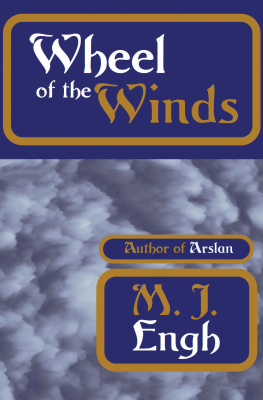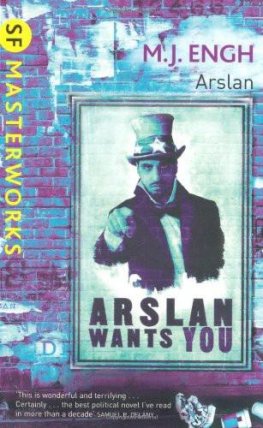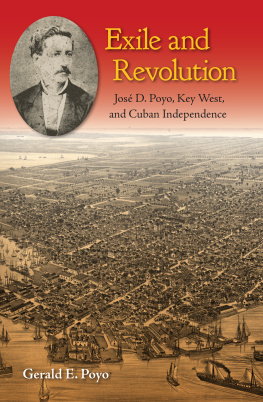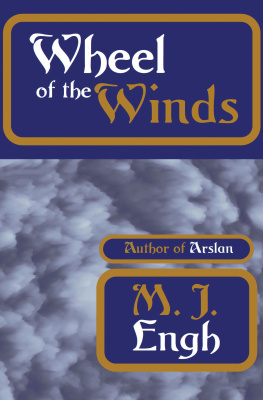

Wheel of the Winds
M. J. Engh

To the memory of Lysander McDog, the original of Broz
The First Turn
It must be a very long riverso you would think, looking at it from here. You would think so because here it was broad and deep, and flowed with a powerful current, and yet here the land was not steep. The river must have come a long way already, gathering water and force from many streams and many heights. But how much farther it flowed before it poured into what sea, you would have no way of knowing.
So you would think, and watch, and turn away again, to pace your creaking floor and finger your cold walls and always turn back at last to the window. Deep, you would know by the size of the largest ships that moved along it; powerful, by the speed with which they swept downstream, swinging in toward the curve of the bank and away, as though they ran on wheels set on an underwater track; and so broad that the forest on the other sideor what you would suppose to be forestloomed low as the thick moss on your window-sill.
Downstreamwhich you might call east, to have some other frame of reference than the riveryou would catch glimpses of the town or city stretched along the far bank at that forest's edge: bright roofs or plazas, as if a giant hand had scattered fish scales amid the moss, a glint of movement. Somewhere out there, somewhere far downstream or beyond that unknown sea, was the equipment you must use. But how much time you had to find it would be still unclear, and how long your ship would wait beyond the flat gray clouds that roofed this sky, and how far downstream your journey lay. East, you might call it for the light that came from that direction. But not a true east; for though it brightened and dimmed as the clouds changed, the light never rose, never sank; the night would never follow. So you would turn, and pace again, and stoop to test the crevices between the planks, and come again to the window. And watch the ships move downstream. Always and only downstream.
Journeys of the Warden of Sollet Castle
There was one of the little coastal ships that plied from Beng to Rotl, and back again, which people called the Mouse, and its captain they called the Woman Without a God, because she had once incautiously answered None when somebody asked her which god she looked to for protection. She had an old black dog with a gray muzzle, that had been with her as long as most people remembered, and so some would laugh and say the dog was her god, or what she had instead of one. But she made a fair living with her Mouse, carrying passengers and light cargo along the Coast, and there were more than a few people, in Beng or Rotl or on the waters of the Soll, who were neither afraid nor ashamed to call her friend.
One of these was the Warden of Sollet Castle, who every year rode down the Sollet in one of the river ships to Beng, disembarking with considerable pomp, and after his business there always sought the Mouse to carry him to Rotl. The two of them would sit on deck, or in the little crowded cabin, with the black dog asleep between their feet, and talk over the year's happenings and what they thought of them; and the Warden would bring out all the news of upriver (which indeed she had heard many times over from the shippers) and the Captain would give him all the news of the Coast (which indeed he had been hearing for two weeks past in Beng). And they would laugh and drink a little ale and speak of growing older, but each of them would find that the other seemed no older at all. And after three weeks in Rotl (for he had family there) the Warden would retrace his journey to Beng; but this time there would be less, and less sociable, talk on board the Mousethere being less news for them to hash over, and the Warden having his mind bent forward on the tedious journey upriver by canal and road, and the Captain's eyes always occupied with the business of her vessel.
It was on the talkative leg of one of these shuttle voyages that the Warden brought out the news of his prisoner. This was a rare plum of a happening, and the Captain had been waiting with interest for him to mention it. Now, Repnomar, (this was the Captain's name) you'll never guess what's come to me from upstream, the Warden said proudly, and paused for her guesses.
Bad weather, I suppose, but that wouldn't make you grin like a beaver, said the Captain.
Bad weather on the Sollet is no news, said the Warden, grinning wider. Though there was that flood that brought us down the raft-load of White People
Shut up and have some more ale and out with it, said Repnomar, a little illogically but with no loss of meaning.
It's not so different from that time. Let's see, five years ago was that?
More like six or seven. What did you get this time, a raft of pink people?
Just one, just one, said the Warden with relish. He had a deep, chuckling laugh that did the heart good.
Here the Captain excused herself to swear at some of her sailors concerning a matter of leeway, and the black dog (whose name was Broz) joined in with a dutiful growl; though indeed, in good weather, this coasting voyage was so routine a business that all hands could have done their share of it blindfold, curses and growls included. Now, Lethgro, said the Captain, leaning back again (for the Mouse was so small that she had not even left her seat by the taffrail to deliver her cursing), now, Lethgro, get it out and get it over. What kind of savage have the waters washed down to Sollet Castle?
And Lethgro the Wardenwith a little more urging, to bring out the full savortold her how the Sollet shippers had delivered to him a man unlike any ever known to have been seen between the Mountains and the Soll. It was clear that he had been driven out from his own place, wherever that was; and his own name, though he tried hard to teach it to them, was so uncouth in sound, and required such uncomfortable and unseemly twistings of the mouth to pronounce, that the Warden and his people soon gave it up and called him simply the Exile. He seemed well enough satisfied with that.
Indeed he was a pert little person, cheerful and uncomplaining so far as his own affairs went, but full of question and suggestion for all else. It was hard, what with his size and his clumsy speech (for he knew little or nothing of any familiar language, and talked in scraps and guesses) and the utter innocence and ignorance of some of his questionsit was hard not to think of him as a child. He asked, for instance, why ships always went downstream (as if a ship could float against the current), and why the light never moved across the sky (to which the Warden had replied, For the same reason, I suppose, that Sollet Castle doesn't get up and walk to Beng and back again, having his journey on his mind).
All things seemed strange to the Exile: the packtrains of sheep moving slowly up the road with their loads of basketry and grain, the great lografts sweeping down-Sollet between the lumber ships, unpainted wood stark white against the dull pink of the muddy river, the hunters with their dogs. He delighted to watch the half-grown pups scrambling up trees with excited yips and jumping clumsily down again, and the river birds dipping and skimming over the waves. The Warden fancied sometimes that the strangeness of the Exile's view (in which the commonest things, it seemed, looked wondrous) was somehow due to the strangeness of his eyes. These were small and pale, but with great pupils that were as round as crow's eggs and had the unsettling property of changing size.
Next page











